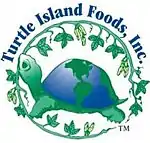Turtle Island Foods
Turtle Island Foods is an American company founded in 1980 in Forest Grove, Oregon and headquartered in Hood River, which produces Tofurky, a popular vegetarian and vegan alternative to turkey, as well other meatless products. All of the company's products are vegan, and most are kosher-certified by the Kosher Services of America.[3] Turtle Island Foods is also the first company in the United States to have their products approved by The Vegan Society in the United Kingdom.[4]
 | |
| Industry | Food products |
|---|---|
| Founded | 1980 in Forest Grove, Oregon, United States |
| Founder | Seth Tibbott |
| Headquarters | Hood River, Oregon , United States |
Areas served | United States, Canada |
Key people | |
| Products | Meat analogue roasts (Tofurky) tempeh |
| Revenue | |
| Website | tofurky |
History
The company name is derived from a common legend found amongst the native people of North America.[5] Once, when all of earth was underwater, a turtle offered its shell as a home for land animals, and that shell became North America. As a result, several Native American and First Nations refer to the continent as "Turtle Island."[6][7]
Headquartered in Hood River, Oregon, Turtle Island Foods began in 1980 in Forest Grove[8] with intentions "to create delicious, nutritious, convenient and affordable vegetarian food."[9] It was founded by Seth Tibbott,[10][11] who began by producing tempeh for friends and family.[10] Tibbot was inspired to create meat substitutes after having become a vegetarian in college.[2] According to Tibbot, the first twenty years of the company had not been economically fruitful, and he built tree houses on a neighbor's property in Husum, Washington, which he rented out to tenants for additional income.[12] With the help of family, Tibbot eventually expanded his company to what is now the second largest tempeh producer in the United States.
The company developed Tofurky in 1995,[2] and initially sold in local markets in Portland, Oregon.[12] During the Thanksgiving season of 1995, the company sold a total of 500 of their Tofurky roasts.[12] In the early 2000s, the company began to grow considerably, shipping a record-breaking 201,108 of their Tofurky roasts in 2006, a 27% increase from the year prior.[13]
In 2008, Turtle Island became a sponsor of The Humane Society, the first food processor to do so in the society's history.[14]
In 2011, the company announced plans to build a new plant in Hood River at a cost of $10 million with a goal to achieve a LEED platinum certification on the building.[15][16] The new 33,000-square-foot (3,100 m2) plant opened in October 2012.[11]
Ecological responsibility
Since 1995, when Turtle Island Foods took an official stand against GMOs, they have made "every effort possible" to avoid them.[17] Much of what the company produces is organic, and Turtle Island Foods is certified by Oregon Tilth.[18] According to the Cornucopia Institute, Turtle Island uses tofu sourced from 100% organically farmed soybeans, and all manufacturing of products is done in the company's facility.[19] The Green Stars Project awarded Tofurky 5/5 green stars for overall social and environmental impact.[20]
The company refuses food ingredients made with hexane solvent extraction, choosing instead expeller pressed isolates and concentrates.[21]
In 2005, Turtle Island Foods began to purchase all of its electricity from the Blue Sky renewable energy project.[22] All paperboard packaging is recycled.[22] In addition, a certain percentage of each year's Tofurky sales is donated to an environmental charity.[22]
Products
Turtle Island Foods currently produces the following, many in a number of varieties:
- Tofurky Roast
- Tofurky Deli Slices
- Tofurky Sausages
- Tofurky Hot Dogs and Jumbo Dogs
- Tofurky Jurky
- Tofurky "Giblet" Gravy
- Superburgers
- Tempeh
In popular culture
In November 2014, Seattle mayor Ed Murray pardoned a Tofurky at Seattle City Hall.[23]
See also
References
- Byrd, Emily (October 17, 2016). "5 Questions with Tofurky's CEO". The Good Food Institute. Retrieved October 9, 2017.
- Brown, Adam (November 24, 2011). "The Story Behind A Guy's $14 Million Tofurky Business". Business Insider.
- "Turtle Island Foods". Kosher Supervision of America. Retrieved October 11, 2017.
- Shurtleff & Aoyagi 2014, p. 1451.
- "I Can't Believe It's Not Turkey". Vegetarian Times: 18. June 1998 – via Google Books.

- "Turtle Island | The Canadian Encyclopedia". www.thecanadianencyclopedia.ca. Retrieved 2020-05-28.
- "Turtle Island". www.deadlystory.com. Retrieved 2020-05-28.
- "Turtle Island Foods". Whole Foods. Archived from the original on November 25, 2012. Retrieved October 9, 2017.
- "Our Roots". Tofurky.com. 12 November 2015. Retrieved October 8, 2017.
- Company History
- Culverwell, Wendy (October 25, 2012). "Turtle Island tops $10M facility with green roof". Portland Business Journal. Retrieved 25 October 2012.
- Andres, Tommy (November 21, 2012). "Inside the Tofurky slaughterhouse". CNN. Retrieved October 9, 2017.
- Shurtleff & Aoyagi 2014, p. 1277.
- "Tofurky sponsoring Humane Society". Portland Business Journal. March 14, 2008. Retrieved 26 October 2012.
- Gunderson, Laura (August 1, 2011). "Tofurky maker, Turtle Island Foods, plans a $10 million plant in Hood River". The Oregonian. Retrieved August 1, 2011.
- "Turtle Island Foods plans $10M Hood River plant". Portland Business Journal. August 2, 2011. Retrieved 26 October 2012.
- Genetically Modified Organisms (GMO's)
- "Turtle Island Foods, Inc". Oregon Tilth. Retrieved October 11, 2017.
- "Tofurky / Turtle Island Foods". Cornucopia Institute. Retrieved October 11, 2017.
- "Daily Footprint, #35 – Tofurky". Green Stars Project. 3 July 2019. Retrieved December 31, 2019.
- Goldwert, Lindsay (April 14, 2010). "Soy Burger With a Side of Toxin?". CBS News. Retrieved December 19, 2016.
- Sustainability
- Wilson, Reid (November 22, 2014). "Seattle mayor pardons Tofurky, because it's Seattle". The Washington Post. Retrieved October 9, 2017.
Sources
- Shurtleff, William; Aoyagi, Akiko (2014). History of Meat Alternatives (965 CE to 2014): Extensively Annotated Bibliography and Sourcebook. Soy Info Center. ISBN 978-1-928-91471-6.
External links
- Company Official website